SPX has a Classic Reversal Pattern
Stock-Markets / Financial Markets 2011 Mar 12, 2011 - 06:34 AM GMT

 Hundreds killed in tsunami after 8.9 Japan quake
Hundreds killed in tsunami after 8.9 Japan quake
(AP) A ferocious tsunami spawned by one of the largest earthquakes ever recorded slammed Japan's eastern coast Friday, killing hundreds of people as it swept away boats, cars and homes while widespread fires burned out of control.
Hours later, the tsunami hit Hawaii and warnings blanketed the Pacific, as far away as South America, Canada, Alaska and the entire U.S. West Coast.
Police said 200 to 300 bodies were found in the northeastern coastal city of Sendai. Another 88 were confirmed killed and at least 349 were missing. The death toll was likely to continue climbing given the scale of the disaster.
The magnitude 8.9 offshore quake unleashed a 23-foot (7-meter) tsunami and was followed by more than 50 aftershocks for hours, many of them of more than magnitude 6.0.
Fed Recovery Flawed as Companies Get Credit Consumers Don't
(Bloomberg) Thirteen hundred miles from Wall Street, Alex Fairchild is still waiting for a little of the U.S. government’s multitrillion-dollar bailouts and Federal Reserve largesse to trickle his way.
His above-average credit score and $20,000 down payment for a $195,000 condo overlooking Miami’s Biscayne Bay didn’t spare the software engineer from a mortgage application process that took so long a government tax credit he was counting on expired. After seven months under contract and appraisals from three underwriters, his developer went bankrupt and New York-based Vanguard Funding declined to provide a loan.
SPX has a classic reversal pattern.
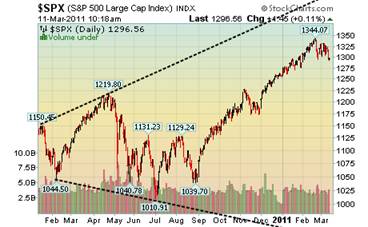 -- The Investment Company Institute has reported a $3.134 billion outflow from domestic equity funds last week. After the prior week's debacle in the market, retail investors may just have had enough volatility to give it up.The retail investor may now be part of the exit strategy for the bank bailout. The banks use the bailout money to speculate in the market. Now they are taking profits. Could this be the big one?
-- The Investment Company Institute has reported a $3.134 billion outflow from domestic equity funds last week. After the prior week's debacle in the market, retail investors may just have had enough volatility to give it up.The retail investor may now be part of the exit strategy for the bank bailout. The banks use the bailout money to speculate in the market. Now they are taking profits. Could this be the big one?
Treasuries launch higher.
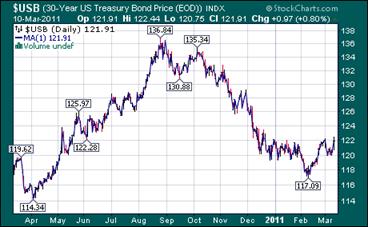 -- Treasuries were headed for a weekly advance as Japan’s strongest earthquake in a century, fighting in Libya and planned protests in Saudi Arabia spurred demand for a refuge in government debt. Yields on benchmark 10-year notes touched the lowest level since January as the Pacific Tsunami Warning Center raised an alert for the Philippines, Indonesia and Chile among more than 20 countries after waves as high as 23 feet engulfed towns in Japan and killed hundreds. Treasuries fluctuated today as U.S. retail sales rose in February the most in four months.
-- Treasuries were headed for a weekly advance as Japan’s strongest earthquake in a century, fighting in Libya and planned protests in Saudi Arabia spurred demand for a refuge in government debt. Yields on benchmark 10-year notes touched the lowest level since January as the Pacific Tsunami Warning Center raised an alert for the Philippines, Indonesia and Chile among more than 20 countries after waves as high as 23 feet engulfed towns in Japan and killed hundreds. Treasuries fluctuated today as U.S. retail sales rose in February the most in four months.
Gold may have lost its luster.
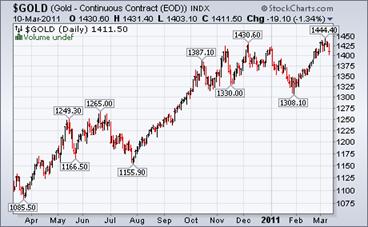 -- Gold futures turned modestly higher Friday after Japan's earthquake stirred more uncertainty into the global economy. After following virtually all other assets lower earlier Friday, gold reverted to gains, finding some support in safe-haven buying. The metal for April added $2.10, or 0.1%, to $1,414.50 an ounce on the Comex division of the New York Mercantile Exchange.
-- Gold futures turned modestly higher Friday after Japan's earthquake stirred more uncertainty into the global economy. After following virtually all other assets lower earlier Friday, gold reverted to gains, finding some support in safe-haven buying. The metal for April added $2.10, or 0.1%, to $1,414.50 an ounce on the Comex division of the New York Mercantile Exchange.
Concerns about Middle East, Oil brings Caution to Nikkei.
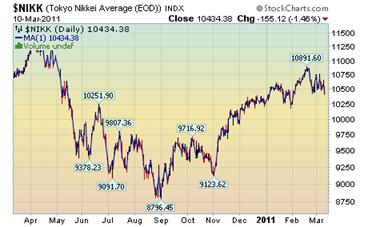 -- Japan’s Nikkei 225 Stock Average tumbled 1.7 percent in Tokyo, extending declines after an 8.9 magnitude earthquake struck northeast of the capital. Government bonds rose and the yen earlier fell to a two-week low. The Nikkei dropped to 10,254.43, the gauge’s lowest close since Jan. 31, after a quake shook buildings in the nation’s financial center and the government issued a tsunami warning.
-- Japan’s Nikkei 225 Stock Average tumbled 1.7 percent in Tokyo, extending declines after an 8.9 magnitude earthquake struck northeast of the capital. Government bonds rose and the yen earlier fell to a two-week low. The Nikkei dropped to 10,254.43, the gauge’s lowest close since Jan. 31, after a quake shook buildings in the nation’s financial center and the government issued a tsunami warning.
China market surprised by inflation, earthquake in Japan.
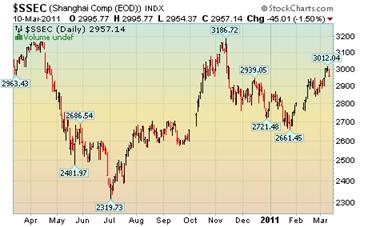 -- China’s stocks fell for a second day, erasing a weekly gain, as higher-than-estimated inflation fueled concerns the central bank will keep raising interest rates and an 8.8-magnitude earthquake rocked northern Japan. “The inflation number is a surprise to the market which has expected to see it slightly lower, at least,” said Tu Jun, a strategist at Shanghai Securities Co. “Speculation about tighter monetary policies may rebound. That would lead the market to gyrate and move downwards.”
-- China’s stocks fell for a second day, erasing a weekly gain, as higher-than-estimated inflation fueled concerns the central bank will keep raising interest rates and an 8.8-magnitude earthquake rocked northern Japan. “The inflation number is a surprise to the market which has expected to see it slightly lower, at least,” said Tu Jun, a strategist at Shanghai Securities Co. “Speculation about tighter monetary policies may rebound. That would lead the market to gyrate and move downwards.”
The Dollar is breaking out of its bullish wedge.
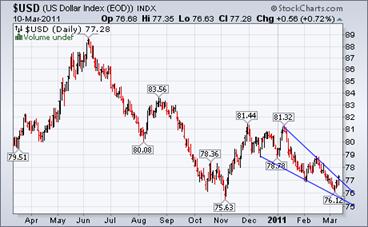 -- The yen rose sharply and U.S. Treasuries prices and stocks initially dipped Friday after an 8.9 magnitude earthquake in Japan caused nervous companies and investors to send funds back home, shifting out of the dollar and the U.S. government bond market.
-- The yen rose sharply and U.S. Treasuries prices and stocks initially dipped Friday after an 8.9 magnitude earthquake in Japan caused nervous companies and investors to send funds back home, shifting out of the dollar and the U.S. government bond market.
The scramble of insurers, companies and other global market participants in reaction to the tragic events in Japan momentarily drew flows out of Treasuries, which are typically a safe harbor in times of geopolitical upheaval, underscoring investors' uncertainty about the broader impact of the earthquake.
Between a rock and a living space.
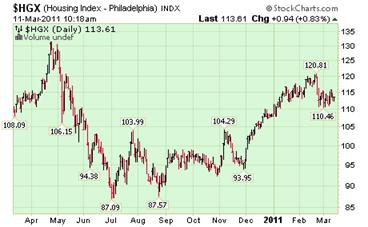 -- IF THERE is one chart that captures the madness of the housing bubble in the first half of the 2000s, it is Robert Shiller’s index of real (ie, inflation-adjusted) house prices in America. The index goes back to 1890, and for the first 100 years or so prices go up and down but gain very little overall. Then, starting in the late 1990s, house prices pretty much double in real terms within a decade (see chart 8). The run-up in values was not just unprecedented, it was obviously lunatic. That begs an equally obvious question: if no one intervened to pop that bubble, is anyone likely to do so next time round?
-- IF THERE is one chart that captures the madness of the housing bubble in the first half of the 2000s, it is Robert Shiller’s index of real (ie, inflation-adjusted) house prices in America. The index goes back to 1890, and for the first 100 years or so prices go up and down but gain very little overall. Then, starting in the late 1990s, house prices pretty much double in real terms within a decade (see chart 8). The run-up in values was not just unprecedented, it was obviously lunatic. That begs an equally obvious question: if no one intervened to pop that bubble, is anyone likely to do so next time round?
Gasoline Prices go parabolic.
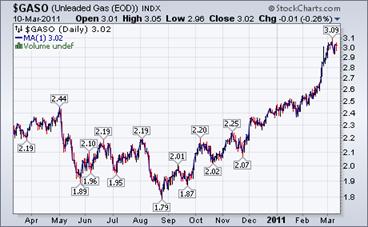 --The Energy Information Agency weekly report states, “The U.S. average retail price of regular gasoline continued its march upward, gaining 14 cents versus last week. At $3.52 per gallon, gasoline is now $0.77 per gallon higher than last year at this time. Combined with last week's 19-cent increase, the gasoline price is up 33 cents over the last two weeks.”
--The Energy Information Agency weekly report states, “The U.S. average retail price of regular gasoline continued its march upward, gaining 14 cents versus last week. At $3.52 per gallon, gasoline is now $0.77 per gallon higher than last year at this time. Combined with last week's 19-cent increase, the gasoline price is up 33 cents over the last two weeks.”
Natural Gas consumption moderates.
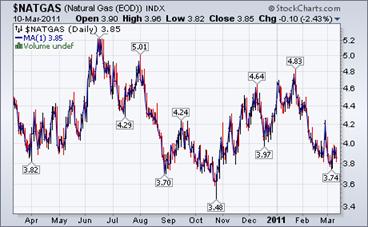 -- The U.S. Energy Information Administration reports, “Prevailing natural gas prices continued their decline during the week except for a brief reversal around Monday and Tuesday when a brief cold snap passed. An overall falloff in natural gas consumption, likely due to moderating temperatures during the week, was a prime catalyst causing the recent general price softness to continue.”
-- The U.S. Energy Information Administration reports, “Prevailing natural gas prices continued their decline during the week except for a brief reversal around Monday and Tuesday when a brief cold snap passed. An overall falloff in natural gas consumption, likely due to moderating temperatures during the week, was a prime catalyst causing the recent general price softness to continue.”
Help Housing? Dump Uncle Sam
(Forbes) A number of politicos and pundits are warning that reforming and/or getting rid of Fannie Mae and Freddie Mac would hit the home-mortgage market hard. Home buyers would have to make big down payments--20% or more--and mortgage interest rates would soar.
Actually, sound reforms are crucial to getting the housing market back on a sustainable growth path. Not so long ago it was the norm in this country to put down 20% on a house. Other abandoned customs: limiting a mortgage to no more than four or five times a family's income, with the maturity of that debt rarely exceeding 20 years. Government pressure trashed these standard practices, which had once made the home mortgage the soundest of securities. We're still living with the consequences of the federal government's fecklessness.
Will The Japanese Earthquake Be The Straw That Breaks Europe's Back?
(ZeroHedge) Two months ago many were scratching their heads when Japan announced it was buying Eurozone bonds. After all - why would Europe want to have a marginal buyer (or as the case may be seller) of its debt be the country that is known by all to be the most indebted entity in the world? Of course, it became promptly clear that it was not the Japanese government doing the buying, but mostly its financial companies, with an emphasis on its insurance and reinsurance companies. Fast forward to today when Japanese insurance companies are getting pummeled in local trading on concerns the payoffs to the decimated Japanese infrastructure will be unprecedented.
Which begs the question: if an earthquake flips its wings in Japan, does the Eurozone go bankrupt, especially in the month when its most insolvent countries face billions in debt rollover requirements, tens of billions in maturity funding needs, even more in deficit funding requirements... and no cash?
Fed Goldilocks Ignites Firestorm, Three Bears Now Homeless
(of TwoMinds) Under the guise of engineering a "Goldilocks" recovery, the Federal Reserve has instead heated up yet another bubble which is now imploding.
The Fed has long played Goldilocks to the U.S. economy, claiming the ability to avoid overheating ("too hot") or contraction ("too cold") and thus engineer a "Goldilocks, not too hot, not too cold" economy. Let's look at a long-term chart of the S&P 500 to see how successfully the Fed's Goldilocks has achieved a steady-state of merely "warm."
Things swung from mighty hot to mighty cold and then back to boiling from about 1995 on. This chart shows that the Fed's claim to Goldilocks powers is pure hubris: what the Fed excels at is not maintaining a "warm" economy of steady employment and low inflation but a bubble economy of rampant speculation that inflates huge asset bubbles which then boil over and take down the real economy, which quickly chills to contraction and recession.
NYSE Short Interest Declines Again, Just In Time For Market Drop
(ZeroHedge) While not at the lows from January, when NYSE short interest hit a multi year low of 12.4 billion shares, the just released update shows that into the end of February, total short interest once again declined from the Mid-February dead cat bounce which saw it at 12.8 billion, with the latest print at 12.6 billion shares. And now that the market is finally realizing that there is a several hundred point vacuum underneath if indeed there is even a brief break in Fed monetization, the number of shorts that may opt to cover on the market's way down is far lower than in recent history. Of course, this is what happens when everyone bets on the Bernanke Put and said Put starts to sputter, which simply means that the Fed chairman, who traditionally equates economic growth with the Russell 2000 is more boxed into a corner than ever.
Lehman Failed Lending to Itself in Alchemy Eluding Dodd-Frank
(Bloomberg) By the time Lehman Brothers Holdings Inc. (LEHMQ) became the biggest bankruptcy in U.S. history, plunging the economy into the worst financial crisis since the 1930s, the firm had made $3 billion in loans to itself in transactions that even today would elude the Dodd-Frank law designed to prevent such financial alchemy.
Lehman turned souring real estate investments into top- rated securities that the bank’s insiders dubbed “goat poo,” according to court records. The securities, called Fenway commercial paper, helped keep Lehman afloat over the summer of 2008, until a trading partner determined they were “worth practically nothing.” That precipitated Lehman’s demise on Sept. 15, 2008, bankruptcy documents and a May 2010 Lehman lawsuit show.
“It wasn’t a mistake to let Lehman fail, it was a mistake to let it live so long,” said Ann Rutledge, a principal with New York-based R&R Consulting and the co-author of two books on structured finance.
Traders alert: The Practical Investor is currently offering the daily Inner Circle Newsletter to new subscribers. Contact us at tpi@thepracticalinvestor.com for a free sample newsletter and subscription information.
Our Investment Advisor Registration is on the Web
We are in the process of updating our website at www.thepracticalinvestor.com to have more information on our services. Log on and click on Advisor Registration to get more details.
If you are a client or wish to become one, please make an appointment to discuss our investment strategies by calling Connie or Tony at (517) 699-1554, ext 10 or 11. Or e-mail us at tpi@thepracticalinvestor.com .
Anthony M. Cherniawski, President and CIO http://www.thepracticalinvestor.com
As a State Registered Investment Advisor, The Practical Investor (TPI) manages private client investment portfolios using a proprietary investment strategy created by Chief Investment Officer Tony Cherniawski. Throughout 2000-01, when many investors felt the pain of double digit market losses, TPI successfully navigated the choppy investment waters, creating a profit for our private investment clients. With a focus on preserving assets and capitalizing on opportunities, TPI clients benefited greatly from the TPI strategies, allowing them to stay on track with their life goals
Disclaimer: The content in this article is written for educational and informational purposes only. There is no offer or recommendation to buy or sell any security and no information contained here should be interpreted or construed as investment advice. Do you own due diligence as the information in this article is the opinion of Anthony M. Cherniawski and subject to change without notice.
Anthony M. Cherniawski Archive |
© 2005-2022 http://www.MarketOracle.co.uk - The Market Oracle is a FREE Daily Financial Markets Analysis & Forecasting online publication.


